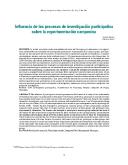Influencia de los procesos de investigación participativa sobre la experimentación campesina
Alternative title
The influence of participatory research processes on farmer experimentation
Description
3 ilus. 3 tab. 13 ref.
Abstract
Se realizó un estudio en dos comunidades del norte de Nicaragua para determinar si los agricultores involucrados en actividades de investigación participativa experimentan de la misma manera que aquellos que no han sido parte de este proceso. Se entrevistaron 31 agricultores quienes se consideran a sí mismos experimentadores además, cada uno había realizado entre 1 y 19 experimentos durante los dos últimos años. La mayoría de los experimentos fue sobre manejo de plagas (42 por ciento) y mejoramiento de la fertilidad del suelo (26 por ciento). Dieciséis agricultores pertenecían a grupos de investigación participativa en sus comunidades estos grupos eran promovidos por especialistas. Los otros 15 agricultores no habían estado involucrados en estos grupos y realizaban sus experimentos por sí mismos. Los agricultores que pertenecían a grupos de investigación participativa señalaron que la mayoría de las temáticas de sus trabajos surgieron a partir de las ideas discutidas en las sesiones de capacitación, y mencionaron a los científicos y agentes de extensión involucrados en esos grupos como la principal fuente de temas para investigar. Estos agricultores también registraron los datos de sus experimentos en forma más sistemática, anotaron sus observaciones y las discutieron con otros agricultores. Por el contrario, los agricultores que no participaron en estos grupos se basaron en observaciones visuales para evaluar los resultados de sus experimentos, y muy pocas veces los discutieron con otros miembros de su comunidad. Los agricultores que participaban en los grupos de investigación comentaron más sobre los experimentos con otras personas, promovieron activamente la investigación y animaron a otros productores a integrarse a los grupos de investigación. A study of two communities of Northern Nicaragua was performed to determine if the farmers involved in participative research activities experimented in the same way as those who have not been part of this process. Thirty-one farmers who consider themselves experimenters were interviewed also each one had conducted between 1 and 19 experiments during the last two years. Most (42 percent) of these experiments were related to pest management and to improving soil fertility (26 percent). Sixteen farmers belonged to participatory research groups in their communities scientists supported these groups. The other 15 farmers had not been involved in these groups and performed their experiments by themselves. The farmers who belonged to participative research groups indicated that most of the themes for their experiments originated from the ideas discussed in the training sessions, and mentioned the scientists and extension agents involved in these groups as the main source of ideas for experimenting. These farmers also recorded the data of their experiments more systematically, noted down their observations and discussed them with other farmers. In contrast, the farmers who did not participate in these groups used visual observations to evaluate the results of their experiments and seldom discussed them with other members of the community. The farmers that participated in the research group commented more with other persons about experiments, actively promoted research and encouraged other producers to integrate into the research groups.
Publisher
Centro Agronómico Tropical de Investigación y Enseñanza (CATIE), Turrialba (Costa Rica)
URI (Permanet link to cite or share this item)
https://repositorio.catie.ac.cr/handle/11554/6399Collections
- Publicaciones y documentos [4422]


